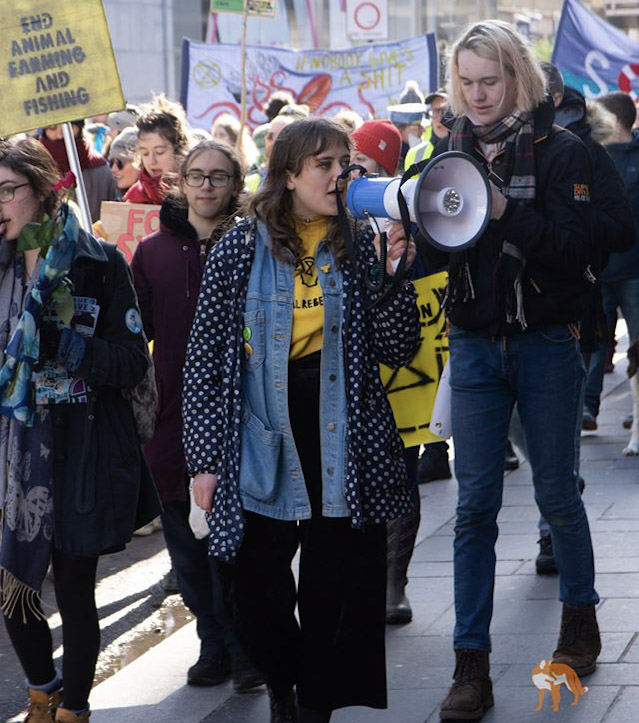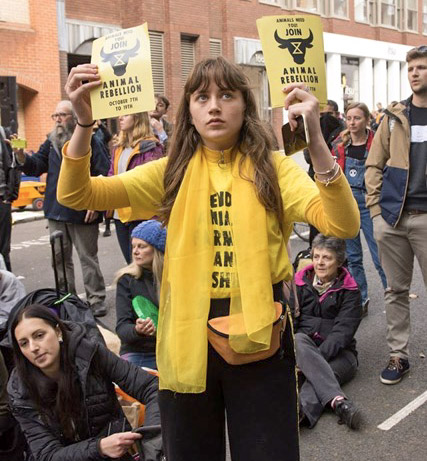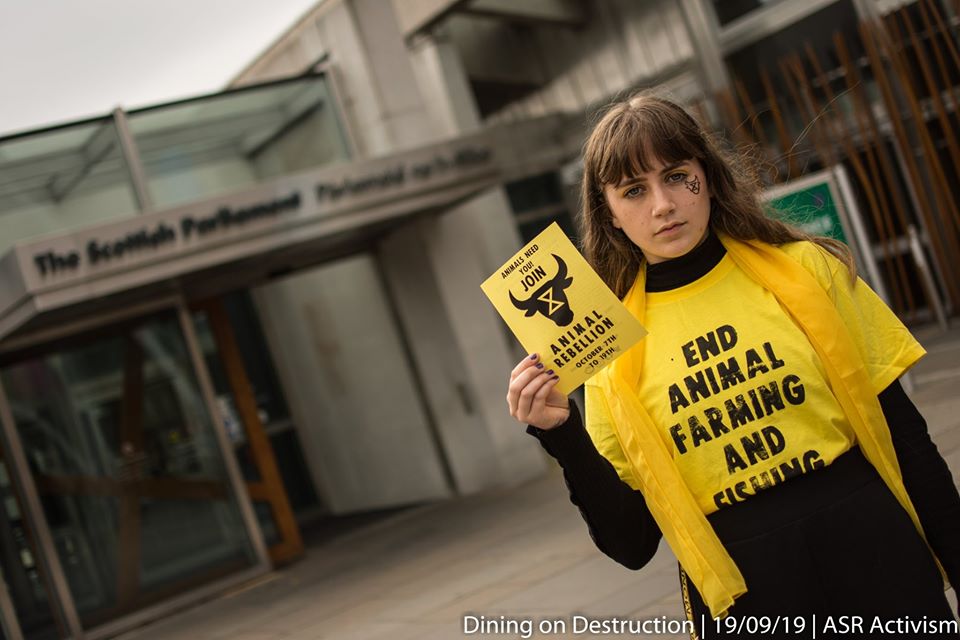Recently, I sat down with Lauren MacDonald, a vegan and climate change activist, to ask her 10 questions about her life and her work.
I admire Lauren hugely. While the rest of the world is talking about how we all need to change our habits and care more about climate change, she is one of the very few people who have actually decided to do something about it.
Lauren was a languages student at Glasgow University when I first met her. She tells me that she found herself becoming increasingly disillusioned by student life and began questioning her purpose there. After her first Extinction Rebellion march, she knew what she had to do and shortly after that she dropped out of uni to dedicate all her energy to activism.
Her latest project, Food4Thought is pushing universities to divest from meat and provide only plant-based food options on campus.
I found her choice incredibly brave and I’ve had so many questions I’ve wanted to ask Lauren ever since. I asked friends and family if they had any questions for her too, and it turns out we are all a really nosy bunch!
So, here it is: 10 questions you have always wanted to ask an activist.
1. How do you make money?
‘In our society today, people earn more than they need and spend way more than they need.’
Lauren worked to save money in a vegan food truck and as a French tutor, and has cut down on expenses massively. She is rejecting a capitalist lifestyle and so has cut out drinking, smoking, fast fashion, and eating out in restaurants.
‘I really only spend money on food, and I eat very cheaply.’ Lauren tells me about embracing a whole-food diet. ‘It’s not expensive to eat mostly rice, chickpeas and broccoli!’.
She says that getting rid of artificial pleasures has actually been great for her mental health and she feels much happier for it. Once she started living this way, she was amazed by how much money she used to spend on stuff that wasn’t important.
She also mentions that she has applied for a grant to support living costs as there are funders out there who believe in promoting vegan diets and sustainable living who can help.
2. What does a typical day look like?
‘It’s different every day but I usually get up and try to give myself as much time as I can before looking at my phone as I know as soon as I do, my workload begins for the day and everyone is needing help with something.’
Lauren tells me that, although her days aren’t structured by a 9-5 job, or uni classes, she does have regular weekly meetings with the groups she works with: Food4Thought and Animal Rebellion.
Her days consist of a lot of laptop work; creating resources, plans, promotional kits to help groups take Food4tThought and set it up in their own universities, or event planning. Her favourite days are spent in the street marching and promoting.
‘I have also learned to schedule enough downtime into my day.’
The work she does is understandably overwhelming. ‘Its important to take time away from the computer screen to regenerate and recharge.’
She says one of the best things she has learned is that it is important to spend your downtime doing things that make you fulfilled – reading, walking, cooking, whatever that may be for you.
3. How do you come up with ideas?
‘I look for gaps and see how we can fill them. Also, I think about where we want to be, then work out how we could get there.’
‘For example, I saw there was a real gap in the movement for student voices. I think a lot of them feel really disillusioned with the system, like they are just thrown into it, I know I did. So with Food4Thought we wanted to get a student voice going and help them change the systems they are in. I want to create a framework that any student can take and create their own group – they are all so busy and focussed on deadlines and uni work and trying to enjoy the ‘best years of their life’ that they don’t get involved – I wanted to make it as easy as I could for them. We have lots of groups getting involved – LSE, UWS, and more.’
‘I also try and think about engaging different demographics as we need everyone involved if we want to make real change, not just a privileged few.’
‘Its also a case of seeing what is already out there and how we can push it forward. I set up Animal Rebellion Glasgow, for example. The framework was already there, we just needed to create a local presence. It’s not always coming up with our own ideas, sometimes its more a case of supporting others.’

4. How do you define the success of your actions? Do you try and celebrate milestones along the way?
‘This is a good one. Before Christmas I hadn’t been celebrating any small achievements and it led to total burnout. I had been working flat out without out even looking at how far I’d come and it overwhelmed me.’
‘Since the start of this year, I have been working with the Food4Thought team and we sat down together to lay out a 6 month plan with ambitious objectives and broke it down to month-by-month objectives. It helps so much to be able to see what we have achieved each month and where this is taking us.’
‘For me I define success by how our actions affect individuals, and seeing how activism has enriched people’s lives. It is amazing to have this strong community and space to talk about our feelings and whats going on with us.’
Lauren tells me that she has learned to define success by the impact she has on people, rather than by outcomes. I found this interesting as, at a workshop run by Volunteer Scotland recently, the discussion had followed a very similar route. The keynote speaker, Dr Toby Lowe, encouraged the third sector funders present to reconsider the ways they measure success as, ‘outcomes are not achieved by organisations’ and people are part of ‘complex systems’.
5. Do you get many online trolls and how do you deal with them?
She laughs, ‘of course, and it used to really get me down.’
‘But I have learned that people want to ‘debunk’ veganism and lash out because they don’t want to change, or because they realise there is some truth to what I am saying and they don’t like it.’
‘I tend not to engage, if they really don’t like it they can unfollow me on instagram, and if they keep following, maybe eventually they will read something that sparks a change.’
I was amazed to learn that this had actually happened. She gives an example of someone who had previously sent her taunting and antagonistic messages, only to reach out months later for some advice!
6. What do you think of KFC's vegan burger?
‘Obviously having veganism publicly acknowledged and publicised is a really good thing, but personally I wouldn’t buy one – it is awful for your health and KFC are awful from a capitalist point of view. They also contribute to the killing of billions of animals every year.’
I ask if she thinks being able to go vegan is a privilege – she responds that this is why we need system change. It shouldn’t be up to someone who is struggling to feed their family to have to completely re-educate themselves and add pressure to their already stressful lives.
People shouldn’t be so misinformed in the first place about what is healthy and what is not, we need to provide better information around this. She acknowledges that vegan alternatives are more expensive than meat and there is no avoiding that. But explains that we don’t need to eat them if we know how to feed ourselves properly with natural ingredients.
‘Vegan capitalism is better than normal capitalism’, she says, ‘but it is much, much worse than no capitalism at all’.

7. What is the best and worst part of being an activist?
‘The best part is actually being out on the streets, at marches, and seeing the culmination of months of planning and hard work. That, and the strong, amazing community that comes with it – I can’t emphasise that enough’
‘The worst would have to be the eco-anxiety and depression that can become overwhelming.’
She goes on to add the caveat that, she feels she can’t say that this is actually the worst part, as it has helped her to learn so much about herself.
‘If I wasn’t living through a climate catastrophe, I don’t know if I would be so present and aware of all I have to be grateful about.’
‘Its all about helping people understand that, once they realise and accept how awful the situation is, it is about living in the present and appreciating the beauty of life as it comes. To get over the shit you have to go through it.’
She then tells me that the worst part is actually when older friends and family don’t care about climate change and veganism as much as she does.
‘It can be quite isolating.’
8. What is the one thing you wish everyone would do as a small act of activism?
‘Obviously I’d say go vegan – its the biggest difference you can make and it is so effective to lead by example like this.’
‘But if you can’t commit to that, then I would say go to the climate strikes. They are once a month for a couple of hours and attending one will connect you to a whole new network of likeminded people and teach you so much about other issues.’
9. How did you first get involved in activism?
‘I went to a climate strike, and there was an open mic session at the end. I opportunistically hopped on the stage to talk about the impact a vegan diet can have on the environment. Afterwards, I spoke to one of the organisers about getting more involved and he added me to a whatsapp group where people were talking about how they didn’t realise veganism was so important to climate change.’
‘Thats how I knew I needed to get involved when I heard about Animal Rebellion. They stand for everything that I am advocating for.’
10. What are your personal motivations for veganism and are they the same as when you started out?
‘Not at all! I initially got interested as I had menstrual and skin problems and I read that dairy can really aggravate this. I remember that really surprised me, so I started reading more about it, watching documentaries, and talking to the one vegan person I knew.’
‘As soon as I had learned about the wider implications of eating meat, the cruel practices and harmful impact of the meat industry, I knew I had to go vegan.’
‘Nowadays, I am doing it to raise awareness of the plight of animals and how much this goes unnoticed by people who would never want to hurt animals themselves. People just don’t think about it.’
If you are interested in finding out more about what Lauren and her team are up to then follow Food4Thought on instagram, Facebook and twitter, or head to their website to sign the petition.
Otherwise, follow Animal Rebellion, Extinction Rebellion, and get your butt along to a climate march!
